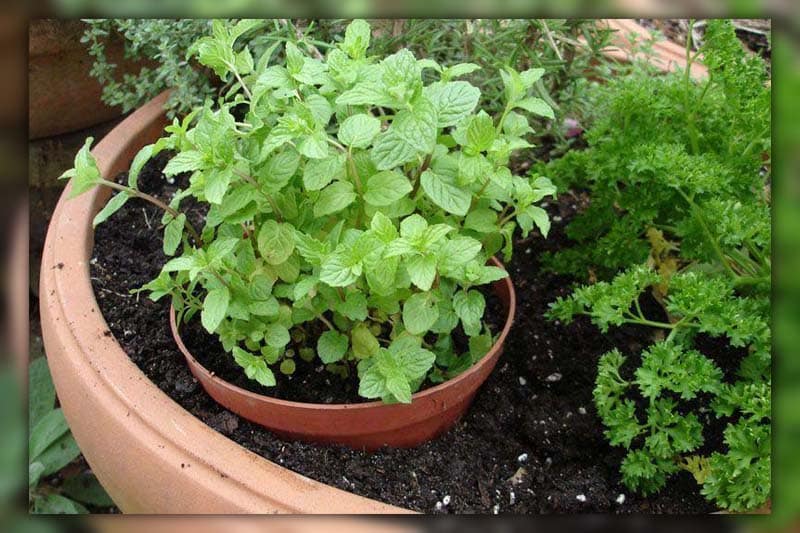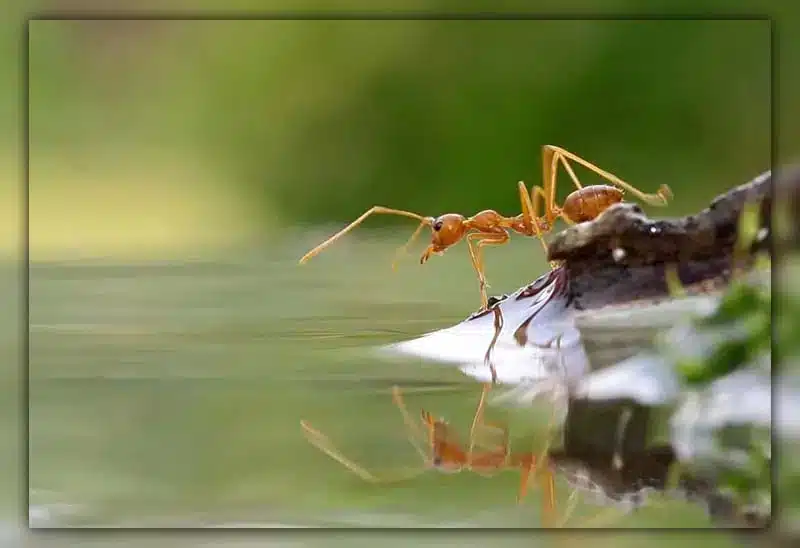Ants. They’re tiny, but in large numbers, they can wreak havoc on your backyard sanctuary. If you’ve found yourself asking, “Why are ants in my yard, and how can I get rid of them?”, then this article is for you.
We’ll guide you through the whys and hows of your ant problem, and even teach you how to permanently evict these unwelcome guests. So, let’s dive in!
Why Are Ants in My Yard?
To effectively deal with an ant infestation, understanding why they’re in your yard in the first place is a critical first step.
Your Yard Has Plenty of Things That Hungry Ants Can Eat
Ants are industrious workers with ravenous appetites. Your backyard, in their eyes, is a buffet. They’re especially fond of sweet stuff and protein-rich foods, so anything from fallen fruit and BBQ leftovers to pet food can attract them. Simply put, your yard is their favorite restaurant.
Water Source in Your Backyard
Besides food, ants need water to survive. If your yard provides a reliable water source, such as a bird bath, pet water bowl, or even a leaky faucet, it’s like a five-star hotel for ants. This combination of food and water makes your yard an ideal home for an ant colony.
A Safe Refuge for Ants is Available
Ants value safety, and your yard can offer plenty of safe havens. Mulch, leaf piles, loose stones, or lawn furniture can all provide perfect places for ants to nest and hide from predators.
Are Ants in Your Lawn Always Harmful?
Interestingly, not all ants are bad news. Some species can actually be beneficial for your garden as they aerate soil and control other pests. However, when the ants start to invade your home or their mounds are destroying your lawn’s aesthetics, it’s time to intervene.
How to Quickly Find Ant Nests?
Locating ant nests can be a bit of a challenge, but it’s a vital step in the eradication process. Start by following their trails. Ants often follow scent paths to and from their food sources. The mounds are usually easier to spot in the lawn, appearing as small piles of soil. However, if you have pavement or deck ants, they might be under slabs or in wall crevices, so you’ll need to do a bit more detective work.
Now that we’ve laid the groundwork, the next step is to strategize the extermination. It’s important to remember that get rid of ants can be a lengthy process. After all, Rome wasn’t built in a day, and an ant colony won’t be wiped out in one either. But, with consistency and patience, you’ll eventually be able to reclaim your yard.
5 Ways to Kill Ants in Yard
Diatomaceous Earth (DE) is an Effective Method to Repel Ants
Ever heard of Diatomaceous Earth? It might sound like something from a science textbook, but it’s a potent weapon in your ant-busting arsenal. This fine powder, made from the fossilized remains of tiny aquatic creatures called diatoms, is harmless to humans but lethal to ants. Sprinkle it around their nests and along the trails they use to get around, and you’ll soon see a drastic reduction in their numbers.
Using White Vinegar to Get Rid of Black Ants in Yard
Next up is a household staple—white vinegar. It’s not just great for cleaning; it’s also an effective way to disrupt ant trails. Ants communicate and navigate using scent trails. By spraying a solution of equal parts water and white vinegar along their trails and around the entrance of their nest, you’ll disrupt their navigation, disorienting them.
Using Baking Soda/Baby Powder to Get rid of Ants in Yard
Another household item, baking soda, or even baby powder, can act as a deterrent for ants. Just sprinkle it where you’ve seen ants, and they’ll be less inclined to cross the powder barrier. Baking soda, when mixed with some sugar to attract the ants, can even be deadly. They’ll carry it back to the nest, where it’ll kill the colony from the inside.
Using Boric Acid Traps to Eliminate Ants in the Yard
Boric acid is another effective tool against ants. By creating a bait with a mixture of boric acid, water, and sugar, you can trick the ants into bringing the poison back to their nest. The sugar attracts them, and the boric acid kills them. However, use this method with caution, especially if you have pets or children, as boric acid can be harmful if ingested.
Using Soapy Water to Deter Ants in the Yard
Last, but certainly not least, is the humble mix of soapy water. A spray bottle filled with water and a good squirt of dish soap can work wonders. The soapy water kills ants on contact and also destroys their chemical trail, hindering their communication. It’s a simple, cheap, and safe solution for ant control.
Remember, these methods aren’t always a one-and-done deal. Consistency is key in your fight against the ant invasion. It may take some time to see results, but don’t give up. Keep applying these methods, and soon you’ll be able to enjoy an ant-free yard again.
While getting rid of ants can be a challenging task, it’s only half the battle. Real success lies in keeping them away for good. In this section, we’ll cover five tips on how you can make your yard less inviting to ants, effectively keeping them at bay.
5 Ways to Keep Ants Away from Your Yard
Keep Sugary Foods and Breadcrumbs Away from Your Lawn
First and foremost, avoid inviting ants to the feast. Remember, your yard becomes an ant magnet when there are accessible food sources. Keeping your outdoor area clean of any food residue, particularly sugary substances and breadcrumbs, can go a long way in discouraging ants from setting up camp in your yard.
Spray Cinnamon Oil on Your Plants to Get Rid of Ants in Yard
Cinnamon oil is a great natural deterrent. It’s believed that ants can’t stand the smell of cinnamon. Try spraying a solution of a few drops of cinnamon essential oil and water around your plants, and you’ll likely see fewer ants in those areas. As a bonus, it gives your garden a delightful, spicy aroma.
Reduce the Amount of Pesticide by Half
You may think that using more pesticide equals fewer ants, but this isn’t always the case. In fact, using too much pesticide can disrupt the natural ecosystem of your garden, killing off ants’ natural predators and potentially leading to an even bigger ant problem. So, try to use pesticides sparingly and only as a last resort.
Plant Mint in Your Backyard
Another natural ant repellent is mint. Planting it in your backyard not only adds a lovely aroma and a pop of green, but the strong scent can also deter ants. Just be mindful that mint can be quite invasive, so consider planting it in pots to keep it under control.

Add a Small Amount of Salt to Ant-Prone Areas
Salt is a simple but effective deterrent. Sprinkle a small amount in areas where you often see ants. It acts as a barrier that ants prefer not to cross. But remember, too much salt can harm your plants, so use it sparingly.
FAQs
Let’s tackle some common queries about these little intruders and how to deal with them.
Does Vinegar Get rid of Ants in Yard?
While vinegar doesn’t actually kill ants, it does confuse them by disrupting their scent trails, which are crucial for navigation and communication. So, while vinegar might not wipe out an ant colony, it can certainly help control their movements and keep them at bay.
Will Salt Kill Ants?
Salt itself doesn’t kill ants but they don’t like crossing a salt barrier. Similar to vinegar, using salt can help control ant movements and deter them from certain areas in your yard.
In conclusion, Pestweek‘s caring and effective methods are the key to successfully killing ants in your yard. With their expertise, you can rid your outdoor space of pesky ant infestations and create a safe, enjoyable environment. Trust Pestweek to help you maintain a beautiful and ant-free yard for your family to enjoy.

Calina Mabel has over 15 years of experience in the field of journalism and communications. Currently, Calina Mabel is the Content Writer for categories such as Cockroach, Ants, Bed Bugs, Mosquito, Rodent, Termite, and Flies on Pestweek.com. She aims to build content for these categories with a focus on providing valuable and accessible information to readers, in order to create the world’s largest knowledge community about Pests.
All content written by Calina Mabel has been reviewed by Emily Carter.


